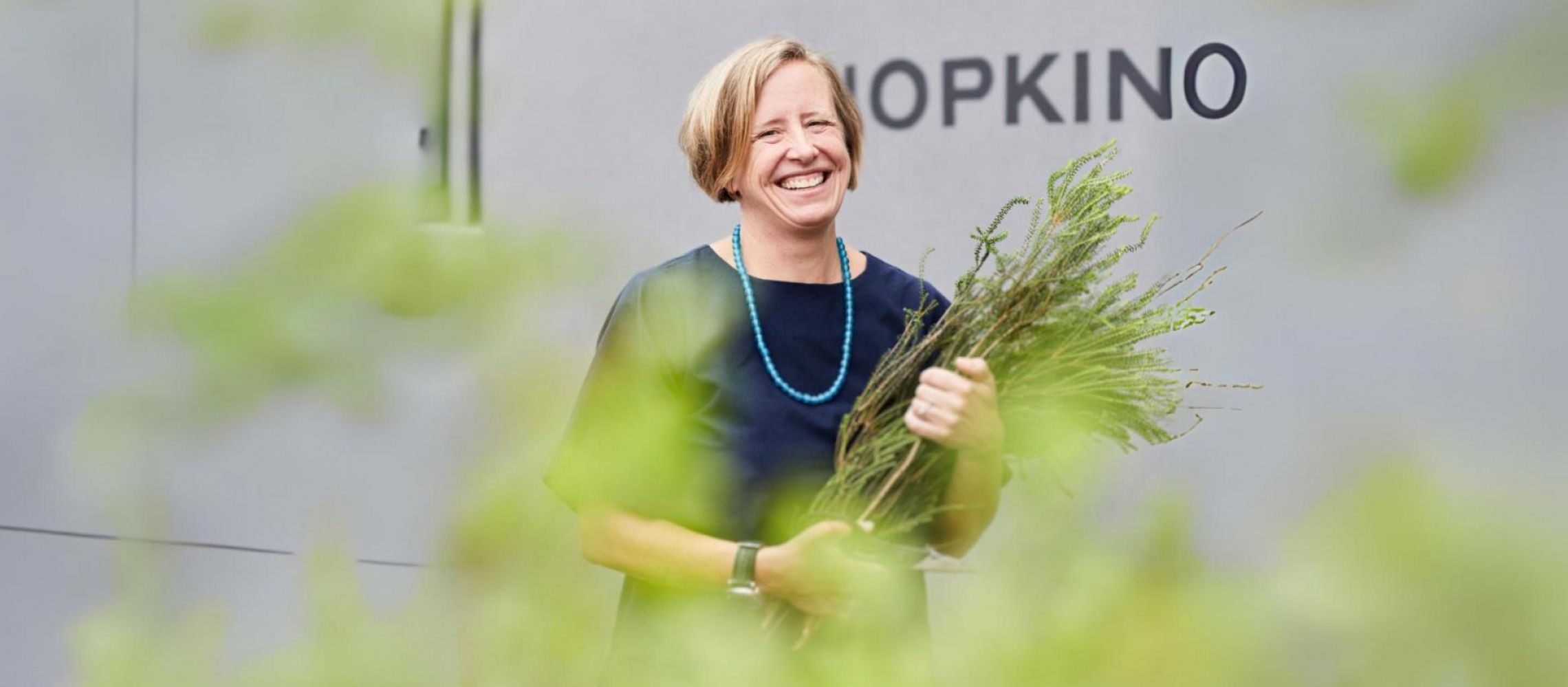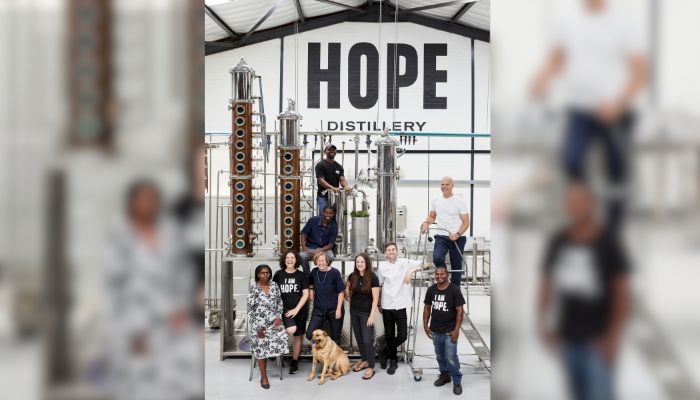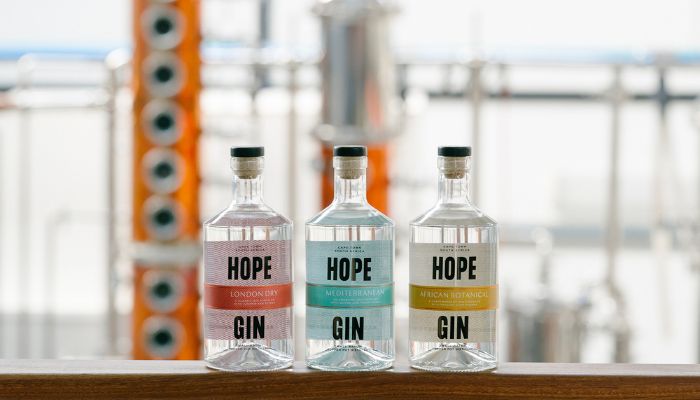Submission Deadline
28 February 2026
Judging
Date
24 & 25 March 2026
Winners Announcement
22 April 2026
28 February 2026
24 & 25 March 2026
22 April 2026

Introducing Lucy Beard, an enthusiastic entrepreneur who was once a lawyer. In the center of Cape Town, Lucy co-founded Hope Distillery with her husband, Leigh Lisk. Their adventure started when they bravely left the corporate world to follow their love of handmade distilling.
Lucy and Leigh, who are originally from South Africa, lived in London for many years until a life-changing camping trip in 2012 inspired them to make a shift. Driven by a passion for exploration and a desire for novel challenges, they jumped headfirst into the distillation industry despite having little prior expertise.
Hope Distillery began as a vision in a decaying warehouse, but Lucy and Leigh continued and worked hard to make it a successful company. They overcame several obstacles, such as unexpected setbacks and license concerns, but they never lost sight of their goal.
Lucy is now in charge of client relations, marketing, and the actual distillation process. She adds a special blend of passion and knowledge to all aspects of the business, along with a strong taste and nose. Hope Distillery is a celebration of regional flavors and South African heritage, not merely a distillery. Every product, like their Rhum Agricole and African Botanical Gin, narrates a tale of creative thinking and history.
As the business advances, Lucy stays committed to sustainability and expansion. She is constantly seeking for new ways to push the boundaries of craft distilling, whether it is recycling production waste or exploring new markets.
Lucy's path demonstrates the transformational impact of following your aspirations. From her humble starting point in Grahamstown to the bustling streets of Cape Town, she demonstrates that with passion and determination, anything is achievable. See the complete interview with Lucy Bread as part of our series on "Know Your Distillers" below.
I’m Lucy and I’m the co-owner and co-founder of Hope Distillery, a small distillery based in the heart of Cape Town, which I set up with my husband, Leigh Lisk, back in 2014. We’re South Africans who had lived in London for many years, working as lawyers and living London life to the full, but decided to pack in corporate life after one rainy English summer too many. We knew nothing about making gin or distilling – our only experience had been in drinking it – but we decided to take the plunge and have never looked back.
We’ve always been pretty adventurous by nature: we met in the small South African University town of Makhanda / Grahamstown, where I was born and bred (and desperate to escape from) and Leigh had opened the local student pub, the infamous Rat and Parrot. Suggesting a trip driving from Grahamstown to Europe was the perfect way to lure Leigh away from Grahamstown, and we spent 6 months on the journey before running out of money in Greece and taking a cheap flight to London where we could camp on a friend’s floor until we got ourselves jobs.
We had both studied law at Rhodes University and set about converting our law degrees and getting into the swing of London life while working all the hours we could to get a bit of cash in. It took a while to convert, but soon I was at the bottom of the “corporate ladder” of a city law firm in London and never looked back. I went from working for a big law firm to working “in-house” at a big television company and thought that we would live in London for the rest of our lives. It was a summer camping trip in 2012 that fueled the adventure bug once again: the campsite we were aiming for in the New Forest was flooded and the cycling event we were due to participate in was canceled due to bad weather. The rainy English summers were finally getting us down! So I suggested we take a sabbatical and follow the sun around southern Europe for a year. We bought a van, negotiated time off from our jobs, and set off in the cold January winter of 2013, heading initially to Morocco where it was much warmer than Europe. Within the first month of our travels we decided we didn’t want to go back to our corporate lives in London (we loved London, but knew well enough that the London life we loved needed the corporate salary to support it), so spent the next few months trying to figure out what to do.
While in both Morocco and Spain, we fell in love with the campsites we stayed in, and initially thought about buying a campsite … and then a little while later fell for a beach bar in Portugal. But we soon realized that it would be challenging to set up something in a foreign country where we didn’t speak the language, especially as there was a huge recession at the time, and it was then that the seed for returning home started to germinate.
We toyed with business ideas for Cape Town, initially looking at guest houses and then thinking vaguely about starting a wine bar. By August we had chatted to a friend who had recently moved back to Cape Town from Germany (the best decision of her life) and so decided it made sense to fly home and suss it out. So we ended up leaving our campervan in a campsite in Spain and flying home for a couple of weeks: partly to look at Cape Town through different glasses, (having spent many holidays in Cape Town with pounds to spend, we knew the reality of living here would be rather different without those pounds) and partly to avoid peak holiday season in Spain. Two weeks in Cape Town in August were more than enough to persuade us that Cape Town would be an amazing place to call our home.
But we still didn’t know what we should do, and it was only after we got back to Spain - where the gin craze was then at its peak - that we asked each other whether we could turn our hands to distilling. After a conversation over a few G&Ts, we did what everyone wanting a change does nowadays, and looked to Google. We downloaded a book on distilling and started reading it and realized that although it was science (and neither of us are scientist), it wasn’t rocket science, and also found that there was a growing trend of craft distilleries popping up around Europe, being set up by all sorts of different people from all sorts of different backgrounds.
And so it was decided: a gin distillery it would be!
We decided there was no point in doing it half-heartedly (and in fact “no half measures” has become our slogan) so bought a run-down warehouse in Salt River, Cape Town River (I had this romantic idea of living on-site at the Distillery in the city) and set about ordering equipment. We flew back to London, resigned from our jobs, sold our flat packed up our lives, and moved into the empty warehouse (a challenge in that it had no hot water, 7 toilets, and no shower) in May 2014. It was a rollercoaster of a journey from there on out: licensing was an enormous challenge; renovating the entire live workspace on a shoestring budget, while living on site was no mean feat and we had plenty of unforeseen challenges including having to replace the warehouse roof last minute once our shiny equipment had just arrived, meaning it was exposed to the winter rains. Once we got our equipment commissioned, we seemed to go from one disaster to the next, with more gin on the floor than anything else. But a year later, having sat the General Certificate in Distilling through the Institute of Brewing and Distilling, we finally got to grips with what we were doing and finally got our licensing through and launched our first product.
It’s been one hell of a journey since too, with the predicted gin boom hitting South Africa during 2017 and 2018, and then, just when we thought we were home dry and getting our heads truly above water, the series of alcohol bans were imposed under the Covid-19 lockdown regulations. Whoever thought life as a distiller would be easy!
But I wouldn’t change it for the world, and when someone from London was chatting to me recently and asked whether I missed the law, the answer was a firm “no”. I love the new world of gin and spirits we’ve entered and being part of the craft drinks industry and the wonderful community of Cape Town entrepreneurs has been amazing. I also love being my boss: yes it’s super stressful at times, but at least it’s my stress and I can have a gin and tonic at the end of the day and call it working!
I run the marketing and reporting side of the business, as well as client relations, and - most importantly - oversee the distilling (we have an amazing Zimbabwean Ranga Mlambo, who is our head of distillery operations and who runs the day-to-day distilling operations) and tasting of all products as well as new recipe development and experimentation.
No two days are alike: there's generally too much admin to get through, but then it could be several meetings (with fellow industry people, our distribution team, the Hope team, etc), a tasting or two, brainstorming new recipes, or overseeing an outside event.

Image: Hope Distillery
My journey is set out in the answer to the first question and then the stories of other small distillers (mainly from the UK and Australia) were so inspirational and kept us going on this journey.
Not skills as such, but I regard my nose and palate as my most important assets! In the early days in particular (when we were still learning along the way), my nose helped us so much: from identifying issues when distillation runs went wrong, to perfecting gin recipes. But attention to detail is also so important as are organizational skills - when we're really busy, the Excel spreadsheet tracking every aspect is essential!
We realized early on that distilling is the easy part; sales and marketing are the difficult bit! But what does help is passion - as a distiller one can talk with such passion about the products and that does help with both sales and marketing: essentially people are buying a piece of our passion, and that's pretty incredible and people also always do love to "meet the maker" as it were.
Passionate with a good nose and palate and a little bit of craziness, as it's a pretty crazy industry to be involved in!
Sales and marketing
We're a small husband and wife-owned brand that focuses on celebrating local and capturing the essence of South Africa in our products, for example, our African Botanical Gin, which is infused with local fynbos, and our Rhum Agricole, distilled from freshly pressed sugar cane juice which expresses the local terroir.
Pricing is our biggest challenge: the cost of all our raw materials has increased above inflation but consumers locally are feeling the pinch as we're entering a recession so things are pretty tough out there.
[[relatedPurchasesItems-63]]
Cider making - we've launched a cider and will also look at distilling it on a small scale for distillery sales and did a wine-making garagiste course to help on the fermentation side of things.
Achieving a balance between work and play: this was certainly difficult in the early days before we had staff to help up, but at least when you work for yourself, work often seems more like play!
Now we're very lucky to have a great team and so we get a bit more away time from the Distillery, which we generally spend either in the sea or on the mountain running with our dog.
I'm a Martini girl - the balcony at our StrangeLove Cocktail Lounge, which is at the Distillery, is the perfect place for an ice-cold Martini.
The Drunken Botanist by Amy Stewart - amazing reference for a gin distiller
Diffords Guide by Simon Difford - everything you need to know about spirits
We blend all our spirits with filtered water sourced from the Table Mountain aquifers (we have a borehole at the Distillery, with a small filtration plant). For the gins, blending is a slow process: we initially let the distilled gin rest, for the botanical oils to settle, for a few days and then cut to just above 75%. Only once it's rested like this for at least 2 weeks, ideally 3, will we blend it down further to bottling strength, which in South Africa is a minimum of 43% ABV.

Image: Hope Gin
When we ferment, we have local pig farmers come and pick up spent grain. We also have a project whereby spent gin botanicals are used by local chefs as well as to go into a local range of "gin botanical spices". We also have arrangements with our informal recycling sector to pick up our cardboard recycling material, from all our pallets of bottles etc.
It's challenging here in South Africa, particularly as we have to import so many of our raw materials (including bottles), so have a big environmental footprint, which is sadly unavoidable. We try and offset this by using lightweight bottles and sourcing as much as we can locally. We also work with the informal recycling sector here in Cape Town to ensure that any packaging-related materials are picked up.
We have found export challenging, as due to the weak South African Rand, we simply do not have marketing budgets for the rest of the world. We've focused on a couple of key external markets, including Africa, and this is slowly starting to work for us.
In South Africa, the craft gin boom is over. There is a rising interest in tequila, but I don't think that it will get the same traction that gin had over the last few years. There is a turn to lower alcohol and RTDs, but not to the same extent as in the rest of the world.
Show your spirits where it matters. Get your products tasted by top bartenders, buyers and experts at the London Competitions — enter now.